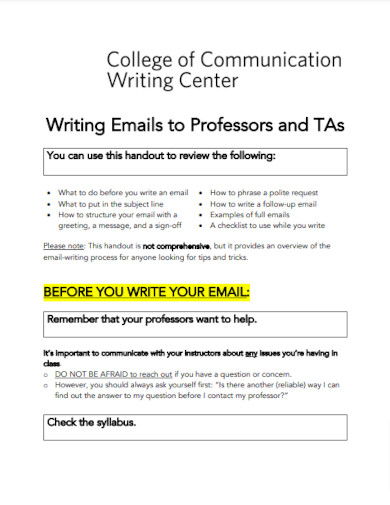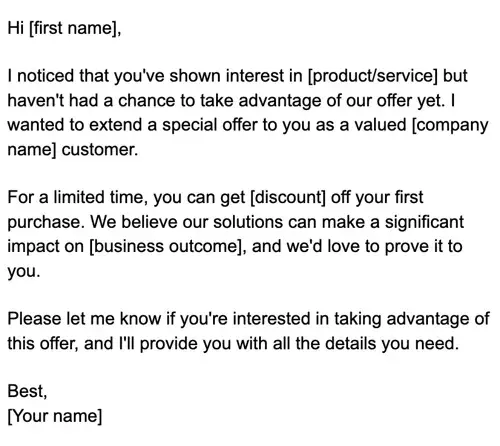Yes, you should email professors before your freshmen year. It helps build connections and shows initiative.
Starting college can be exciting and nerve-wracking. You want to make a good impression and get ahead. Emailing professors before your freshmen year can give you a head start. It shows that you are proactive and eager to learn. Professors appreciate students who reach out early.
This simple step can open doors for guidance, advice, and even research opportunities. Plus, it can ease your transition into college life. Knowing your professors before classes begin can make you feel more comfortable and confident. So, why wait? Start building those connections now.

Credit: www.instagram.com
Benefits Of Emailing Professors Early
Reaching out to professors before your freshman year can bring many benefits. Starting communication early helps you get a head start. You can build connections, understand courses better, and feel more prepared for the new academic journey. Let’s dive into some specific advantages.
Build Relationships
Emailing professors early allows you to start building relationships. Professors appreciate proactive students. They might remember your name and face when classes begin. This can help you feel more comfortable in their classes. You might also get useful advice on how to succeed in their courses. A strong relationship with a professor can be valuable throughout your college years.
Gain Insights On Courses
By emailing professors, you can gain insights on courses. Ask about the syllabus, required materials, and expectations. This information helps you prepare better. You can plan your schedule and study routine accordingly. Knowing what to expect can ease your transition into college life.
Professors can also provide tips on what to focus on. Their advice can guide your studies and help you perform well. Understanding the course content beforehand can boost your confidence. It makes the start of your freshman year less overwhelming.
How To Find Professors’ Contact Information
Finding professors’ contact information can be essential before starting your freshman year. Connecting with professors early can help you feel more comfortable and prepared. This section will guide you on how to locate their contact details.
University Website Resources
Most universities have detailed websites. These sites often include faculty directories. To find them, visit the main university website. Look for a section named ‘Faculty’ or ‘Directory’. You might find it under ‘About Us’ or ‘Academics’. Here, you can search for professors by name or department. Their email addresses and office locations are usually listed.
Academic Department Listings
Each academic department often has its own website. These websites provide specific information about faculty members. Go to the department’s webpage. Look for a section like ‘Faculty’ or ‘Staff’. You will find a list of professors. Their contact information is typically included here. This can be a great way to find the right person to email.
Crafting A Professional Email
Connecting with professors before freshman year can be beneficial. It shows initiative and helps build early rapport. This sets a positive tone for future academic interactions.
Crafting a Professional Email
Sending an email to a professor before your freshman year can be a great way to introduce yourself and ask important questions. But how do you craft a professional email that leaves a good impression? It’s simpler than you think. Here are some practical tips.
Subject Line Tips
Your subject line should be clear and concise. It should give the professor a good idea of what your email is about without being too wordy.
For instance, “Prospective Student Inquiry” or “Question About Freshman Year Courses” are effective subject lines. Avoid vague subject lines like “Hello” or “Question.”
Proper Email Etiquette
Start your email with a polite greeting. Address your professor formally, using “Professor” followed by their last name.
Introduce yourself briefly. Mention your name, your current status (incoming freshman), and any relevant details, like your intended major.
State your purpose clearly in the next paragraph. Whether you have questions about the curriculum, want to know about research opportunities, or need advice on course selection, be direct.
Here’s an example: “I am writing to inquire about the research opportunities available for freshmen in the Biology department.”
Always thank the professor for their time before you sign off. Use a formal closing like “Sincerely” followed by your full name.
Proofread your email for grammar and spelling errors. A well-written, error-free email shows that you are serious and respectful.
Remember, a professional email can set a positive tone for your future interactions. Have you ever wondered how small details in communication can make a big difference? It’s something worth thinking about.
What To Include In Your Email
Reaching out to professors before your freshman year can be a wise move. Knowing what to include in your email is crucial. Crafting a clear and respectful message will help you make a good impression. This section will cover the key points to include when emailing professors.
Introduction And Background
Start with a polite greeting. Introduce yourself. Mention your full name and the course you will be attending. State your interest in the professor’s class or research. Briefly explain why you are reaching out. This helps the professor understand your purpose and context.
Specific Questions Or Concerns
List any specific questions or concerns you have. Be direct and concise. This could be about the course syllabus, textbooks, or office hours. Asking clear questions shows that you are prepared and engaged. It also makes it easier for the professor to respond.
Common Mistakes To Avoid
Before freshman year, avoid emailing professors with generic questions. Instead, focus on specific, relevant inquiries. Avoid unnecessary communication that may clutter their inbox.
Emailing professors before your freshman year can be a wise move, but it’s crucial to do it right. Many students make common mistakes that can hinder their chances of making a good impression. Let’s dive into these pitfalls and learn how to avoid them.
Being Too Informal
Avoid using casual language in your emails. Professors are professionals and expect a certain level of formality.
Think about how you’d address a boss. Would you start with “Hey” or “Yo”? Probably not.
Instead, use formal greetings like “Dear Professor [Last Name]” or “Hello Dr. [Last Name].”
Sending Generic Messages
Don’t send the same email to multiple professors. They can spot a generic message from a mile away.
Take the time to research each professor’s work. Mention specific projects or papers that interest you.
Personalize your email to show genuine interest. This effort can make a significant difference.
Consider asking yourself: what makes you excited about this professor’s work? Share that enthusiasm in your email.
Avoid these mistakes, and you’ll be well on your way to making a positive impression before your freshman year even begins.

Credit: resume.io
Timing Your Email
Reaching out to professors before your freshmen year can be a strategic move. However, the timing of your email is crucial. Crafting your email at the right time can make a significant difference in getting a positive response. Let’s break down the best times to reach out and when you should avoid hitting that send button.
Best Time To Reach Out
The optimal time to email professors is typically a few weeks before the semester starts. During this period, they are less overwhelmed and can give your email the attention it deserves. Sending your email around mid-July or early August can be ideal.
Consider sending your email during weekdays, preferably in the morning. Professors are more likely to check their emails during regular working hours. A well-timed email can make your request stand out amidst a busy inbox.
Avoiding Busy Periods
Avoid emailing professors during the first week of the semester. This period is often chaotic with new courses starting and administrative tasks piling up. Your email might get lost in the shuffle.
Finals week is another time to avoid. Professors are usually swamped with grading and student inquiries. Sending your email during this time can lead to delays or even being overlooked.
By considering these timing tips, you increase your chances of making a positive impression. Remember, a well-timed email shows that you are thoughtful and considerate. Have you had success or challenges with emailing professors? Share your experiences in the comments below!
Following Up On Your Email
Following up on your email to professors before freshman year can be a crucial step. It shows your dedication and genuine interest. However, it’s important to be strategic about when and how to follow up.
When To Send A Reminder
Timing is everything when it comes to sending a reminder email. If you haven’t heard back in a week, it’s a good idea to send a polite follow-up. This shows persistence without being too pushy.
Keep your reminder short and to the point. Mention your previous email and express your continued interest. Professors are busy, and a brief, respectful nudge can help.
For example, if you emailed on Monday, you can follow up the next Monday. This ensures you give the professor enough time to respond while keeping your request fresh in their mind.
How To Handle No Response
Sometimes, despite your best efforts, you may not get a response. This can be frustrating, but it’s not the end of the world. Professors receive numerous emails daily, and yours might have been overlooked.
If you don’t get a reply after your follow-up, consider reaching out to a teaching assistant or another professor in the department. They might be able to help or direct you to the right person.
Remember, persistence is key but knowing when to move on is just as important. Don’t let one unresponsive email discourage you. Keep trying and maintain a positive attitude.
Have you ever had to follow up on an email to a professor? How did you handle it? Share your experiences in the comments below.
Additional Ways To Connect With Professors
Connecting with professors before your freshmen year can be beneficial. There are several ways to build these connections beyond just email. This can help you feel more confident and prepared as you start your college journey.
Office Hours
One effective way to connect with professors is through their office hours. Professors set aside specific times to meet with students. These sessions are great for asking questions and discussing your interests. You can also seek guidance on your academic path. It shows your enthusiasm and willingness to engage.
Academic Events And Seminars
Attending academic events and seminars is another excellent way to connect. Many colleges host lectures, workshops, and panel discussions. These events often feature professors and experts in various fields. Participating in these events allows you to learn more about subjects of interest. It also provides opportunities to interact with faculty members. Engaging in these activities demonstrates your commitment to learning.

Credit: www.examples.com
Frequently Asked Questions
When Should You Email Professors?
Email professors during their office hours or working hours on weekdays. Avoid weekends and late nights.
Should I Email My Professor Before School Starts To Introduce Myself?
iYes, email your professor before school starts. Introduce yourself and express enthusiasm for the course. This shows initiative.
When Not To Email A Professor?
Do not email a professor late at night. Avoid emailing about non-academic matters. Refrain from contacting them during holidays or weekends. Do not send lengthy emails. Avoid emailing without a clear subject.
How Do I Email A Professor Before Classes Start?
Begin with a polite greeting. Introduce yourself briefly. Mention the course you are enrolled in. State your purpose clearly. Thank the professor for their time.
Conclusion
Reaching out to professors can be a smart move. It shows initiative. You can get useful insights and build connections. This can ease your transition into college life. Be polite and concise in your emails. This effort can make a positive impression.
So, consider emailing them before your freshman year. It can help you start on the right foot.
